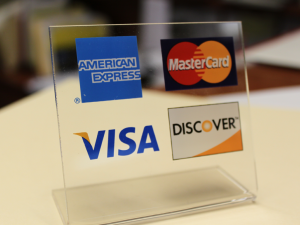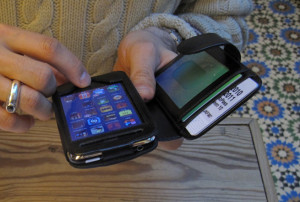September 30th, 2013 by Admin
Credit card processing involves three separate cost components for vendors who choose to accept this type of payment from customers for goods or services. The same cost components apply to debit cards. Only one cost component is negotiable.
The first component is an interchange fee, which is payable to the card holder’s issuing bank. It is a combination of a transaction volume percentage fee and a flat-rate transaction fee. Interchange fees are collectively agreed upon through Visa and MasterCard by a card’s issuing bank and are fixed costs.
Interchange fees take into consideration various information about a card. Types of cards include debit and credit, while categories of cards refer to commercial and reward cards. Processing methods include whether a card is swiped or manually keyed. Swiping a card is usually more economical for vendors.
Secondly, an assessment fee is charged by the card’s brand holder. Brand holders include Visa, MasterCard and Discover. Assessment fees are also fixed costs. Additionally, Visa charges a monthly fee.
The final charge is known as a processing fee. Processing fees vary among processors and is negotiable. Vendors are charged a processing fee, which can cause a difference in cost from one vendor to another. More credit card information: TopTenReviews
Jeremy is a tech blogger at TopTenReviews. He lives outside Salt Lake City, Utah
Posted in Best Practices for Merchants, Credit card Processing, Electronic Payments, Merchant Services Account, Visa MasterCard American Express Tagged with: accept, assessment, cost, credit card processing, debit cards, fees, flat-rate, interchange, keyed, payment, Processing, Rates, swiped, Swiping, transaction, volume
August 15th, 2013 by Admin
The Federal Trade Commission recently charged a merchant account provider with violating federal law. The business sells credit card and debit card payment processing services to other small businesses in a business to business or B2B fashion. Allegedly the business made unsubstantiated and false claims to unwary businesses. Read more of this article »
Posted in Credit card Processing, Electronic Payments, Merchant Services Account, Visa MasterCard American Express Tagged with: b2b, credit card processing, FTC, ISO, merchant account, merchant services, MSD, terminal, transaction
August 13th, 2013 by Admin
MasterCard who has endorsed Google Wallet on the Sprint network will now endorse the ISIS network for mobile wallet solutions. Both Google and Sprint have not joined ISIS and it is interesting to see card issuers invest in both platforms. With Verizon, AT&T and T-Mobile in alliance with ISIS, could Sprint be next? Google? Well count Visa and MasterCard as Isis partners. After securing American Express both Visa and MasterCard will now have their credit cards available in Isis’ Wallet. What will be in your mobile wallet?
Many mobile wallet providers are looking at the various options for electronic transaction processing. Will NFC beat out all the others? It’s hard to say but with Apple having yet to release an iPhone model with the chip on board, it could be a yet unseen technology that wins out. QR Codes and Carrier billing are gaining traction for devices without NFC installed and SmartSD cards are coming equipped with NFC to extend devices that have a card slot available.
With device limitations, mobile wallets are still in flux. There are approximately 5 different types of mobile wallets today. There are digital bank accounts similar to prepaid credit cards offered by banks and mostly used for person to person or P2P payments. Mobile payment apps that link payment accounts like those offered by Starbucks or PayPal. Card containers like Apple Passbook store credit cards and loyalty rewards card information and can even fill in forms requesting that information. Similarly, Credential and Card containers store credit card and loyalty rewards but also store identity credentials.
True mobile wallets directly mimic a physical wallet and allow the customer to chose between various credit cards, debit cards even electronic benefits transfer or EBT cards at the point of sale. These wallets are typically app based for both iPhone and Android smartphones and tablets. These wallets can link account information to a point of sale terminal via NFC or other methods for a secure electronic transaction.
Branding and Banks
In recent times Visa, MasterCard and American Express signs at the point-of-sale was a branding element designed to instill confidence for the consumer. With digital wallets becoming the interface for payments, this branding may fade into the background. Yet payment card issuers find themselves in a precarious position. The big three are participating in multiple digital wallet programs in order to not be excluded. This early in the game there are multiple movers and shakers like Square, PayPal, Lemon, Google and now banks and cellular carriers getting into the game, no one knows who consumers and merchants will eventually prefer over the others. It’s like a wait and see game that forces them to play. As banks enter the arena they are favored to win because of the solid loyalty they enjoy from their customers. Though they may not be fair in other categories, they win the security of their customers.
Posted in Credit card Processing, Digital Wallet Privacy, Electronic Payments, Mobile Payments, Mobile Point of Sale, Near Field Communication, Point of Sale, Smartphone, smartSD Cards, Visa MasterCard American Express Tagged with: American Express, Android, Apple, AT&T, google, Iphone, ISIS, MasterCard, PayPal, Square, Starbucks, T-Mobile, Verizon, Visa MasterCard American Express


